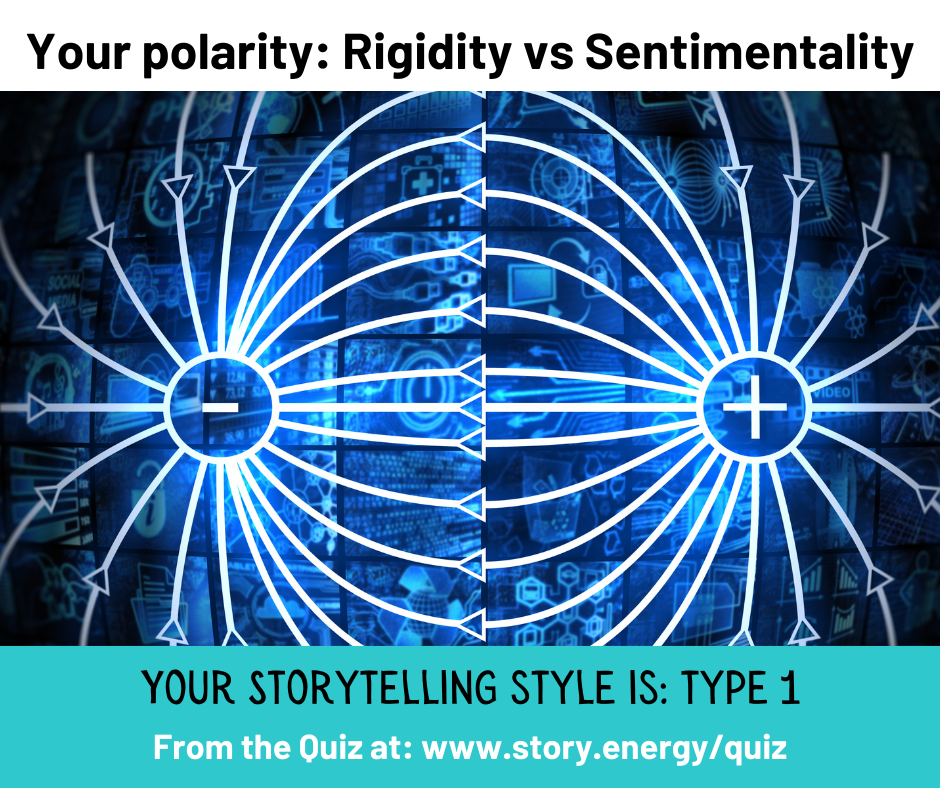Storytelling Style 1
Enneatype 1 is called The Perfectionist, The Critic, or The Reformer
The personal evolution of the Perfectionist is propelled through a tension created by their fixation: the need to be perfect or right and the fear of being wrong or imperfect, which reflects the polarity of rigidity versus sentimentality. By embracing this tension as a tool for storytelling, the Perfectionist creates stories that honor both sides of this polarity. Through the act of storytelling, they explore the nuances of their own psyche, moving closer to their personal truth and achieving a level of personal growth that is both transformative and cathartic.
When Storyweaving, your work channels the spirit of:
INTUITION and the Domain of SENTIMENT
Your Storytelling Style is the orientation of your Ego Fixation, AKA your enneagram type.
Once upon a time, there was an author who had always strived for perfection in their writing. No matter how successful their previous work had been, they were never satisfied with it. They would spend hours pouring over every word, making sure that everything was just right.
The author admired famous people who were known for their ability to pay attention to detail and get things done right, like Michelle Obama, Martha Stewart, and Gandhi. They thought that if they could perfect every aspect of their writing, it would surely lead to success. However, their fixation on perfection had led them to lose sight of the joy of writing and become overly self-critical.
One day, as the author sat in front of their computer, struggling to find the perfect words for a story, they came across an article about people who had faced challenges and learned to embrace their imperfections. Through the examples of these people, the author learned that perfectionism was not the key to success, but rather a path to self-sabotage.
They discovered that the pursuit of perfection had been holding them back from fully expressing themselves and their creativity. By embracing their imperfections and realizing that they were a necessary part of their journey, they were able to write with more freedom and ease.
The author began to find more joy in the process of writing and was able to produce work that was more authentic and unique. They were able to let go of their self-criticism and their constant need to strive for perfection, and instead embrace the beauty of imperfection.
Through their writing, the author was able to connect with readers on a deeper level, as they learned to let go of their desire for perfection and embrace all aspects of themselves. The author's work became more authentic and relatable, and they were able to release their writing to the world with a sense of confidence and ease.
The truth your stories help us remember:
"The awareness that Reality is a process, moving with direction and purpose. Within this movement each moment is connected by the process with the one goal, and thus is perfect." - Ichazo, 1972
Your storytelling shadow may sound like:
“I am the only one that does the right thing. Most people are inconsiderate, lazy, and amoral.”
Be aware of getting caught in this emotional working style:
Serenity vs Anger
Watch out for Overdoing the polarity of:
Right vs Wrong
Be aware of transmitting
this unconscious Story Message:
“It’s not ok to make mistakes” or “It’s not ok to be wrong” or “It’s not ok to behave badly.” What type 1’s long to hear is “You are good” (or you are good enough).
The ultimate goal of my Storytelling:
To realize that we are all perfect as we are (complete and whole), that our worth and well-being are inherent and not dependent on our being right or wrong.
See, your Storytelling Style is what it is, because The Art of Transformational Storytelling is YOUR vehicle for transforming YOURSELF, with a side effect of transforming your audience.
We have made a powerful in depth course on this topic exactly:
FAMOUS ONES
The culture of the Amish, Julie Andrews, Arthur Ashe, Hanan Ashrawi, St. Augustine, Author William Bennett, Father Phillip Berrigan, Ambrose Bierce, Psychologist John Bradshaw, Lloyd Bridges, NBC's Tom Brokaw, Sierra Club founder David Brower, Feminist author Susan Brownmiller, William F. Buckley, Dr. Helen Caldicott, John Calvin, Mona Charen, Cesar Chavez, Hillary Clinton, Confucius, Actress Jane Curtin, Michael Dukakis, Christian Scientist Mary Baker Eddy, Activist Daniel Ellsworth, Harrison Ford, Jodie Foster, Barry Goldwater, Author Lillian Hellman, Katharine Hepburn, Charlton Heston, St. Ignatius, Glenda Jackson, Peter Jennings, Author Samuel Johnson, CNN's Myron Kandel, John Kasich, U.S. Senator John Kerry, Dr. Jack Kevorkian, C. Everett Koop, Ted Koppel, NRA Vice President Wayne LaPierre, Martin Luther, Nelson Mandela, Miss Manners, Thurgood Marshall, George McGovern, Michael Medved, Playright Arthur Miller, Author Jessica Mitford, Sir Thomas More, Kate Mulgrew, Ralph Nader, the cultural aura of New Zealand, Leonard Nimoy, the NRA, John Cardinal O'Connor, Pope John Paul II, Gregory Peck, H. Ross Perot, Sidney Poitier, Emily Post, Colin Powell, the culture of the Puritans, Marilyn Quayle, Yitzak Rabin, Tony Randall, James (The Amazing) Randi, Actress/Activist Vanessa Redgrave, Dale Evans Rogers, Actor Cliff Robertson, Satirist Mark Russell, Carl Sagan, Conservative author Phyllis Schlafly, George Bernard Shaw, CNN’s Bernard Shaw, the cultural aura of Singapore, Film critic Gene Siskel, Maggie Smith, Alexander Solzhenitsyn, Dr. Benjamin Spock, Martha Stewart, Actor Peter Strauss, the cultural aura of Switzerland, Margaret Thatcher, Fred Dalton Thompson, Emma Thompson, Harry Truman, Mark Twain, Abigail Van Buren, Greta Van Sustern, Father Terry Waite, Dragnet's Jack Webb, James Whitmore, George Will, Myrlie Evers-Williams, John Wooden, Joanne Woodward, Actress Jane Wyman, Efrem Zimbalist, Jr.
Now you know and can recognize the deep nature of your storytelling style! Discover how to gain the maximum benefit from this information - explore our in-depth course.

